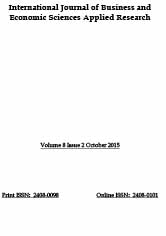Investigation of the Greek Stock Exchange volatility and the impact of foreign markets from 2007 to 2012
Investigation of the Greek Stock Exchange volatility and the impact of foreign markets from 2007 to 2012
Author(s): Nikolaos Sariannidis, Polyxeni Papadopoulou, Evangelos DrimbetasSubject(s): Economy
Published by: Τεχνολογικό Εκπαιδευτικό Ίδρυμα Ανατολικής Μακεδονίας και Θράκης
Keywords: Greek market; volatility; GARCH models; Day-of-the-Week effect
Summary/Abstract: Purpose of this paper - The current paper aims to analyze the impact of the debt crisis on the FTSE / ASE 20 index volatility. The research also examines the impact of powerful foreign capital markets on the Greek Stock Exchange market, the seasonality returns (Day-of-the-Week effect) and the volatility structure. Design/methodology/approach - The analysis of data is made by employing the GARCH models, and more specifically the GJR-GARCH model. Findings - The results of the GJR-GARCH model demonstrate that the debt crisis and, therefore, its consequences increase the FTSE / ASE 20 index volatility and the Greek market does not react asymmetrically to negative information. In addition, the results indicate the importance of foreign markets in shaping the first moment of the FTSE / ASE 20 index and the presence of the Reverse Day of the Week effect. Research limitations/implications - The implication of volatility measurement is vital in determining the cost for investment, security pricing markets, hedging and other trading strategies, and also for regulatory policies conducted within financial markets. Originality/value - The paper may prove helpful to regulatory authorities, investors and financial analysts to understand the structure and behavior of volatility in a small stock exchange market under crisis.
Journal: International Journal of Business and Economic Sciences Applied Research (IJBESAR)
- Issue Year: VIII/2015
- Issue No: 2
- Page Range: 55-68
- Page Count: 14
- Language: English

